BEWARE: This article contains SPOILERS for both Rogue One and The Force Awakens.
PREFACE: I do, despite what it may appear, enjoy The Force Awakens!
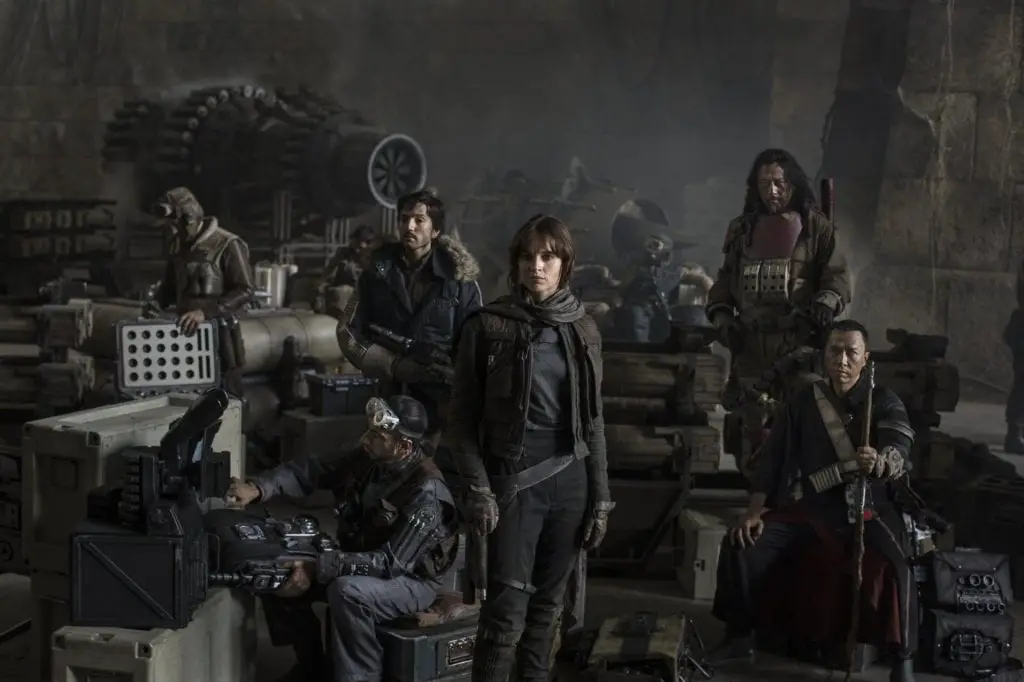
We are currently in a Star Wars revived renaissance with a movie coming out every single year and two divergent paths for the franchise as a whole now that it’s been revamped by its move to Disney. The latest (and greatest I’d argue) of the revival is Rogue One, which is also known as a “Star Wars Story”—a clever way to categorize it with the other stand alone anthology pieces in the works versus the Skywalker space soap opera that makes up the primary storyline and “episodes.”
Referred to as a Star Wars “war film,” Rogue One sparked some interest but generally flew under the radar until it opened, in direct contrast to The Force Awakens, the other Star Wars title (part of the Skywalker Saga) released in the past year. However, after The Force Awakens did its primary job in rebooting our nostalgia, clearing the bad taste the prequels left in our mouths, and introducing us to a new group of adorable actors to gush over, it falls flat.
As even South Park joked with its “member berries” plot line this season, The Force Awakens sold us on nostalgia for nostalgia’s stake and capitalized on that while covering up the fact that at its core, the narrative is just a retread with little to no new visual or thematic lenses through which to revisit old stomping ground (with, arguably, one exception). It caught Star Wars fans at their most vulnerable, when they were hungry for something that actually resembled the original films they grew up loving, while in reality blinding most to the fact that they were just being force fed nostalgia to hide a lack of nuance, fresh, or confident storytelling.
That’s not to say The Force Awakens isn’t an incredibly enjoyable ride on the nostalgia train, but when you hold it up to the recently released Rogue One that finds its strength in character (though some disagree), grounded story, and a new take on an old darling, it can’t hold its flame.
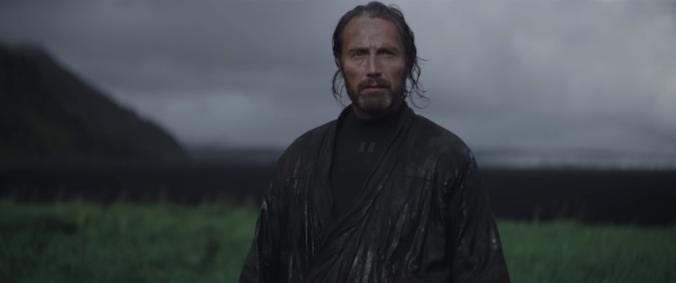
Rogue One from the very beginning showed us that it wasn’t going to be too worried about killing its darlings while still assuring us that said darlings would be handled with care. As opposed to a recycled plot, we go on a new journey with some familiar faces and elements to ground us along the way.
Right off the bat, director Gareth Edwards makes a bold choice in ridding the film of the characteristic Star Wars opening crawl, instead choosing to make use of its medium and show us (rather than tell) us important character information. While there is not one Star Wars fan that doesn’t recall with fondness the beginning of a Star Wars film as the John Williams score blasts out of the speakers and the text shoots across the screen, it is in the elimination of said nostalgia that Rogue One and Edwards make it clear that anything and everything will be done to better service the storytelling. Rogue One knows what it is, knows what it needs, and isn’t afraid to reach out and take it at the risk of offending or angering the sleeping lions that are passionate fans.
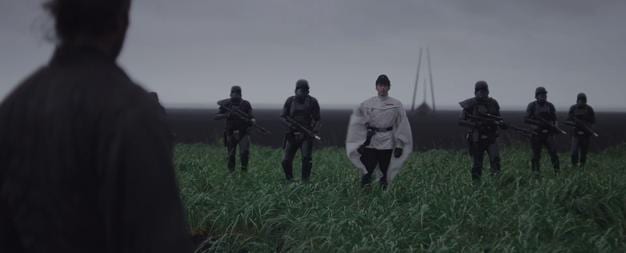
Thus, instead of a prologue, we get an incredibly necessary, moving, and action-packed opening that jumps right into the heart of the story. We immediately learn more here about our protagonist and the world in those first few minutes than we ever did in all of The Force Awakens. From just the prologue, we can piece together that the Empire has all but taken over completely, a wave of fear and hate mongering spreading throughout the galaxy and the Erso’s have resisted and fought against the venom spreading, rebels that have pushed back against what they saw to be depravity gaining traction all around them.
There’s a real fight in Jyn’s mother Lyra that screams revolutionary and a calculating silence in Galen that already sets up his willingness to play the long game for the greater good. These are the two people who Jyn learns from in her early life and we see that steeliness right away when she immediately goes into perseverance mode after watching her mother be shot and hearing the men who did it come after her, a movement that is so ingrained into her at such a young age that it could have only come from having ran this drill several times. Even her childhood was always about survival.
That is also where it soars miles above The Force Awakens; characters and their arcs. At the forefront, we obviously have our two protagonists; Rey and Jyn. Both actresses (Daisy Ridley and Felicity Jones, respectively) are incredibly talented and imbue all sorts of layers and texture into what is just text. However, when looking just at text and direction, most of Rey’s nuances and grounding came solely from Ridley’s performance versus Jyn’s which are derived from both the script and the direction. Rey is our protagonist in The Force Awakens yet we only know vaguely why she does what she does and who she is. Most of that has to come from afterthought and speculation as the film itself mainly functions as a two hour set up for what is presumably more to come in its following features.
Rogue One of course, being a stand alone, never had the luxury to even think about loose ends, but it also doesn’t wish to. Jyn’s story, her character, and her arc are contained in one film. Just because a film is expected to have sequels (or any piece of long form storytelling for that matter) doesn’t mean that you can forgo giving the audience a clear picture of who your protagonist is, why they do what they do, and what journey they are on that will end at the finish of the film.
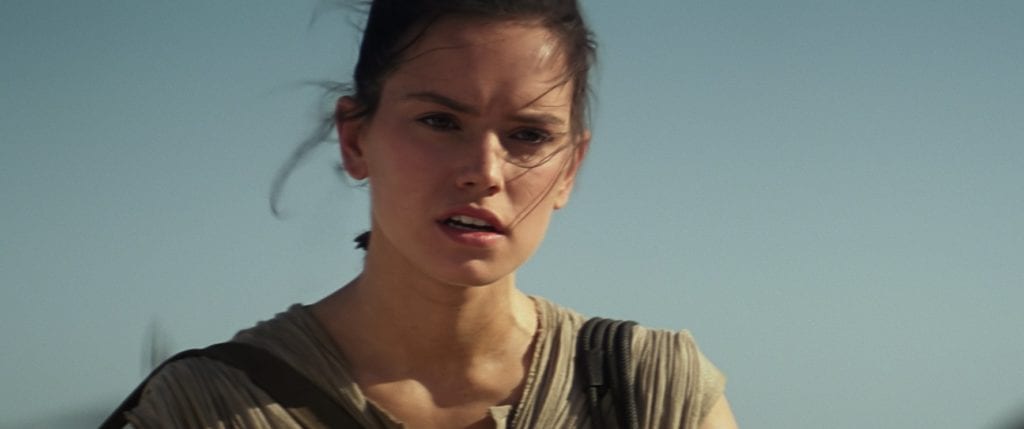
What happens with Rey and all the mystery surrounding her backstory is that she becomes a mystery in a sense as well. She becomes a thing rather than a person; a puzzle we have to solve. Instead of giving the audience insight into what is presumably the strongest motivational factor in her life, the traumatic childhood she continually flashes back to and the lonely life of raising herself that came with it, we are virtually blinded as to why she makes her decisions with such conviction (something that is a fallacy of the film itself as it doesn’t ever give its characters or story time to get where they need to go). It’s like having A New Hope without ever seeing Luke’s aunt and uncle die or getting all of the information on Vader, who he is, and Luke’s familial past from Obi Wan. When treading operatic territory with your story, you must ground it in human emotion and conflict and we can’t possibly understand the conflict, understand Rey’s unwillingness to depart from Jakku for example, if we aren’t keyed into all of this beforehand.
Thus Jyn goes on a journey that Rey is simply unable to go on because we aren’t given the arc or information to allow us or her to process said journey together. With Jyn, we see her go from a victim of abandonment, someone who has had to learn how to fend for themselves growing up in a time of war, learn to care about others and embrace her morality to risk her mortality for the greater good. She grew up learning how to be necessarily selfish and she learns to be unrelentingly selfless. She was trained with a military clinicalness and detachment but battles in the morally grey area, unable to deny the heart and fight for righteousness instilled in her by her caretakers.
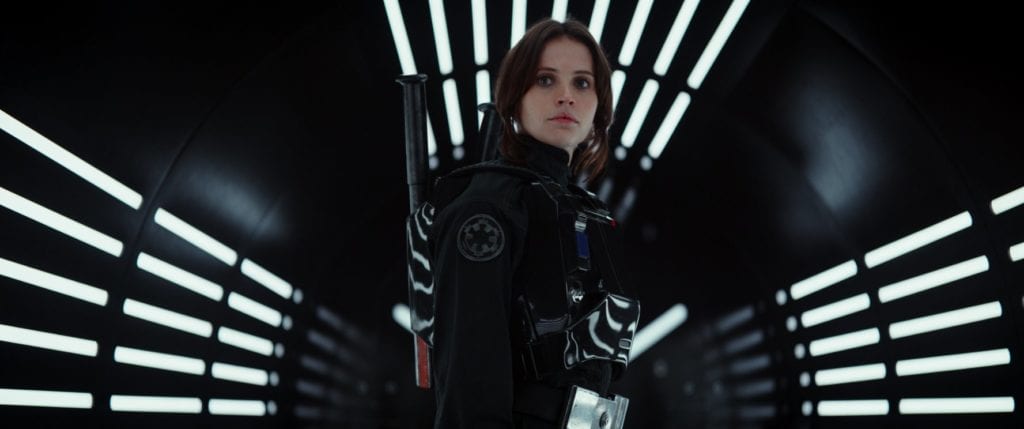
Rey, we know, is a scavenger who has also had to fend for herself most of her life, although we have no information other than that as to who her parents were or the life she had before she lived alone. She’s scrappy and angry because of it and at first seems to want to resist growing attached to anything for the fear that it might leave her too, but that quickly turns on its head as soon as she spends more than five seconds of bickering with someone or something. It’s a character trait that would have been really interesting to explore but gets lost immediately.
Jyn and Rey both struggle to take their position in the greater fight but what is more of vague destiny for Rey is a character choice for Jyn. She doesn’t have to do what she does and there is nothing greater telling her she should. In fact, she was actively denied the ability to fulfill that position and she and a handful of others wishing to make the selfless sacrifice to save the rebellion only did so by going “rogue”. There is no predestined aura surrounding these characters or this story. It feels so inherently human. Jyn is just another soldier who steps up to lead. Rey is made into another puzzle piece because of the “chosen one” quality surrounding her.
It’s nice to see a female character take on that position that is so often male; a predestined savior, but we are never allowed to know why. We see the line immediately with Luke; why he matters and why it must be him. Rey, with the information we are given, seems to be a random citizen of the galaxy chosen to be the ultimate extraordinary savior that we are supposed to accept as the chosen one without the information to make that position worth the weight its suggesting. Everything with Rey is too fast; from her attachment to Han Solo and Finn to her grasp of the Force after the initial push-back. Those music cues need information in the script to support them.
Rogue One manages to imbue the same sense of grounded character in all of its ensemble. Where the characters in The Force Awakens seem plot motivated or contrived to service the viewing experience, Rogue One seems to house characters that are actually people.
Cassian Andor is our secondary protagonist and immediately, right off the bat, we can also understand who he is and the dilemma he will face over the course of the story. He’s a rebel, a fighter, but he’s also a hired gun that is being told where to point his deadly weapon. He kills an innocent to save himself and the mission right off the bat, but we see that while he follows his orders, he doesn’t do so with an easy mind. As Chirrut mentions, he carries his prison everywhere he goes.
He’s essentially a soldier just following orders for a cause he believes in, but in every cause, on every side, there are still morally grey decisions and it is up to the individual to decide whether those decisions impede on their beliefs. Cassian eventually, on an almost opposite journey from Jyn, realizes that sometimes the greater good isn’t always correct and realizes that he must make his own choices to do what is right. When the alliance refuses to answer the call to battle that would save everything they worked for because they can’t agree or don’t think its strategic for their greater cause, he finally makes the choice to do what he feels is right, noting that he knows he’s done terrible things in the name of what he thought was right and he couldn’t continue on, knowing that, if he stopped now, when it all matters.
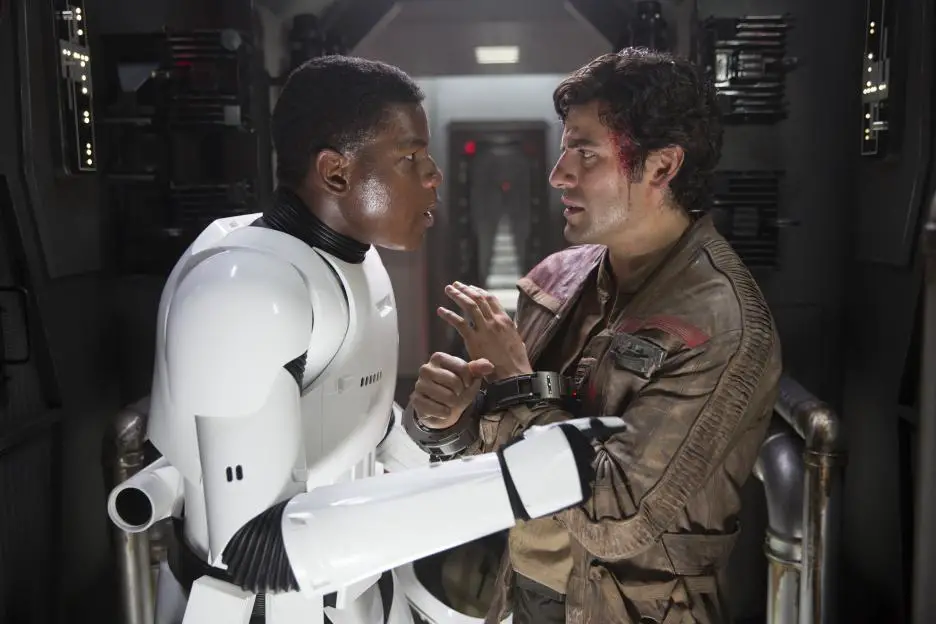
His connection with Jyn fuels this, and it’s a connection that plays naturally as opposed to the incredibly fast paced relationships we see form in The Force Awakens. Rogue One immediately puts its characters through hell and back, pushing them to reach their breaking point together and when that happens, it is only natural that a closer connection forms quicker. They have both seen the worst and the best of each other and have been better influences on one another. This relationship forms and evolves over the course of the film as opposed to the joyful but ridiculously fast and abrupt bromance (or romance…we’ve all seen that lip bite!) between Poe and Finn. Most of that questionability also comes from the lack of exploration of Finn’s arc and journey.
His story can actually be paralleled with Bodhi Rook in Rogue One; Finn an Stormtrooper who runs away from it all after his first mission out of sanitation and Bodhi, a pilot for the Empire until he defected to deliver a message from Galen Erso, a move to finally push back against the rising fascist system. We didn’t have to even see Bodhi psychically defect; we only see the aftermath but with that, we see his struggle. He’s not immediately confident in his newfound position as a rebel. It scares him after being conditioned to not rebel and seeing the true power of system he’s fighting against. He reluctantly claims his position as a defector most of the time, struggling to embrace the danger of fighting for justice until the end, running through laser blasts and fire, sacrificing his life for the cause and for Galen.
This is opposed to how The Force Awakens deals with Finn’s defection. Finn doesn’t seem to have a moment where he questions wanting to get out; which is strange for a person who has been raised as a Stormtrooper and grew up inside of the system that has been said to never exhibit any signs of resistance before. Also, his one moment of humanizing another Stormtrooper dies after that opening scene as we see him recklessly, without abandonment, shooting down his fellow troopers. He mows them down without a hint of regret, a motion that seems odd considering he was just a trooper himself not that long ago and it is the death of a fellow soldier that triggered his awakening.
There are so many moments to explore Finn’s journey, but instead his place in the story is there to fill a functioning plot device to keep forward action and occasionally be comic relief, rather than the complexity we see exhibited by Boyega that was unfortunately not reflected in the writing or directing. From his moments confronting Kylo Ren, to facing his fellow Stormtroopers, it would have been a joy to see the humanization of these produced soldiers come to light and his personhood go on a journey of self discovery and reclamation.
Overall, Rogue One wins with its ensemble exploration and its overall character introspective, giving everyone their moment and perpetually exploring the moral grey-ness of people, power, and movements. The antagonists are all justly motivated, whether it be by power or beliefs, and are all on journeys of their own to attain or keep their coveted positions, and the protagonists are all distinct characters that have a full circle arc. That moral ambiguity also comes to play in its own beautiful way of setting up more world building in a way that Star Wars never had before. In what is normally a battle of dark vs. light, Rogue One shows us the humanity behind these wars. The rebellion isn’t all good; we don’t always agree with their choices or their decisions and they don’t agree with each other. We see the human factions forming, from the extremists with Saw Gerrera, willing to fight fire with fire, and the Alliance splintering from within in pure desperation for a movement that seems almost lost. They are all willing to go to extremes or make questionable choices because their situation is so dire. They make the call to kill Galen because they don’t have the luxury to risk anything else.
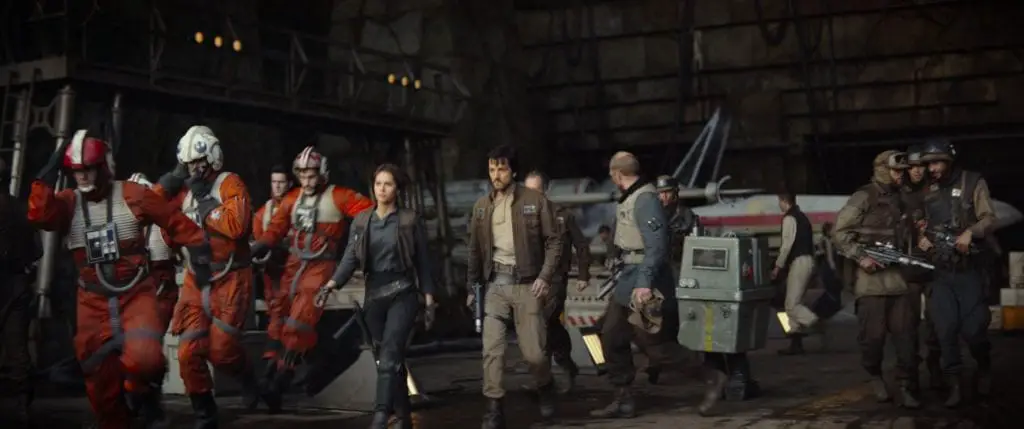
In that way, Rogue One is the most successful at characterizing rebellion. It starts small and it starts splintered but it takes something greater; a new spark to truly light it. We see this small group of freedom fighters desperate to hold onto a cause they believe in that is about to get enveloped by the growing wave of a hateful regime.
It’s not as stressed or apparent in The Force Awakens, despite the heavy handed nazi parallels (are they even parallels when Hux literally gives a Hitler-esque speech to which the Stormtroopers salute?), a notion that is clearly recognized as a theme but never explored. The victory at the end of the film, the attaining of the Death Star plans is the one spark that fueled the rebellion; their first victory and it’s so powerful to see people fight and risk their lives for the hope of something greater in the future. That last sequence, as rebels handed off the plans while being cut down by Vader, is the epitome of hope. These people know they wont live but use everything within them to ensure that the cause continues on after they die. All their lives will have meant something more; hope, the clear theme of the film.
From the power of the Empire, and Stormtroopers that are truly capable of doing their job, Rogue One sets itself on the perfect three act journey that grabs you the whole way through. The same, upon review, unfortunately cannot be said of The Force Awakens that upon first examination does everything right but at the same time, everything wrong. Where Rogue One felt like a grounded character study of hope and war, The Force Awakens needed to take a breath to allow it to give life to itself beyond simply opening its eyes.
Rogue One ultimately knows what it is and is confident in being so where as The Force Awakens pales in comparison and if it weren’t for the performances, a lot of the characters and their motivations read quite flat, constantly worried about overstepping when it was the moment to be bold. From its beautifully diverse cast, well built characters, thematic journey, and founded, human storytelling, Rogue One soars, makes you care, and then makes you sad that you wont be visiting with this truly great ensemble ever again. Perhaps it is the tighter hold on the Skywalker-centric features and the freedom Gareth Edwards was given, but Rogue One knew its place as a Star Wars film without ever being confined to being so.
Also it is important to note: why was there a map to Luke in the first place if he didn’t want to be found?

